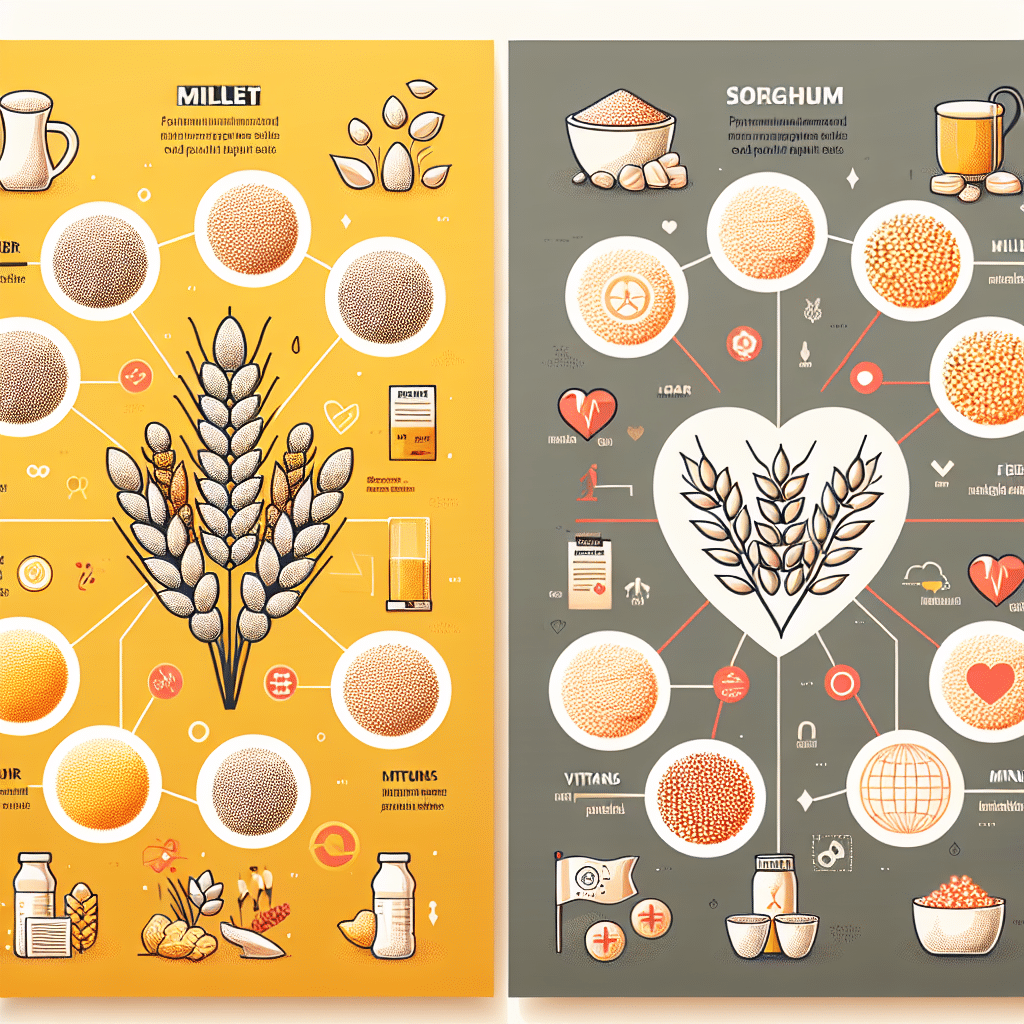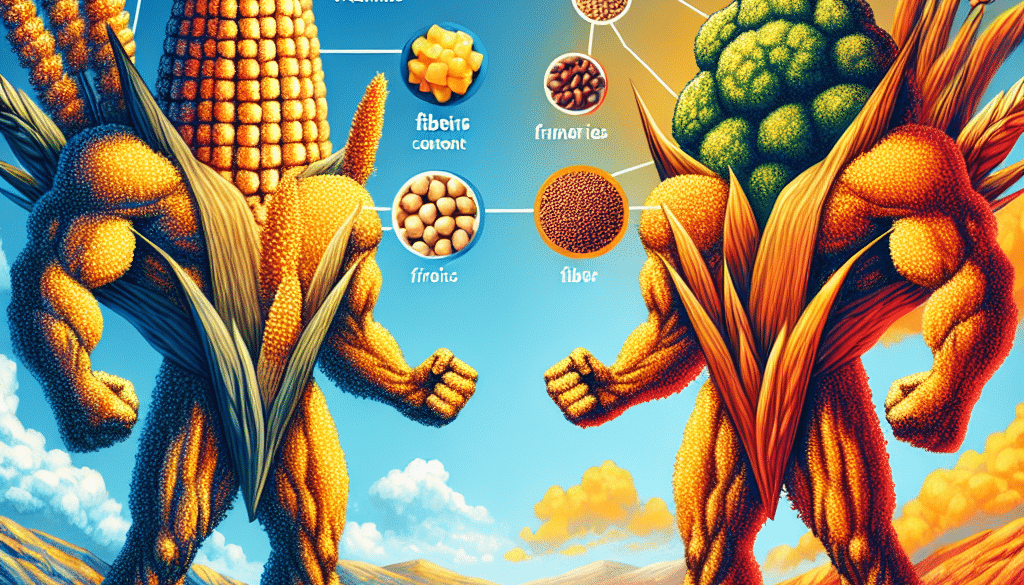Which Is Healthier Millet Or Sorghum?
-
Table of Contents
Millet vs. Sorghum: Evaluating the Healthier Grain Option

When it comes to choosing healthy grains, millet and sorghum are often part of the conversation. Both grains are ancient crops that have been cultivated for thousands of years and are known for their resilience to harsh climates. They are also gaining popularity in the health food market due to their nutritional benefits and gluten-free nature. But which of these grains is healthier? This article delves into the nutritional profiles, health benefits, and potential drawbacks of millet and sorghum to help you make an informed decision.
Nutritional Comparison of Millet and Sorghum
Both millet and sorghum are nutritious grains that offer a variety of health benefits. To understand which grain might be healthier for you, let’s compare their nutritional content.
- Calories: Both grains are similar in their calorie content, with millet providing slightly fewer calories per serving than sorghum.
- Protein: Sorghum has a slight edge over millet when it comes to protein content, making it a good choice for those looking to increase their protein intake.
- Fiber: Both grains are high in dietary fiber, which is beneficial for digestive health. Millet tends to have a higher fiber content, which can be advantageous for those seeking to improve bowel regularity.
- Vitamins and Minerals: Millet is rich in B vitamins, especially niacin, B6, and folic acid, whereas sorghum contains higher levels of antioxidants like phenolic compounds and anthocyanins.
- Carbohydrates: Sorghum and millet have similar carbohydrate profiles, with complex carbs that provide sustained energy.
It’s important to note that the nutritional content can vary depending on the variety of millet or sorghum and the soil in which it’s grown.
Health Benefits of Millet
Millet is not just a single grain but a group of small-seeded grasses that are widely consumed around the world. Here are some of the health benefits associated with millet:
- Gluten-Free: Millet is naturally gluten-free, making it a great option for those with celiac disease or gluten intolerance.
- Rich in Nutrients: It is a good source of magnesium, phosphorus, and antioxidants, which are essential for bone health and reducing inflammation.
- May Help Control Blood Sugar Levels: The high fiber content in millet can help in slowing down the digestion process, potentially reducing spikes in blood sugar levels.
- Heart Health: Millet contains essential fats that provide natural oils for the body, potentially benefiting heart health.
Health Benefits of Sorghum
Sorghum, also known as milo, is a powerhouse of nutrients and offers several health benefits:
- Rich in Antioxidants: Sorghum is high in antioxidants like flavonoids, phenolic acids, and tannins, which can help reduce oxidative stress and lower the risk of chronic diseases.
- May Help Manage Cholesterol: Some studies suggest that the fiber and plant compounds in sorghum can help lower bad LDL cholesterol levels.
- Supports Digestive Health: The fiber in sorghum aids in maintaining a healthy digestive system and promoting regular bowel movements.
- May Have Cancer-Fighting Properties: The antioxidants in sorghum may have the potential to inhibit the growth of cancer cells, although more research is needed in this area.
Potential Drawbacks and Considerations
While both millet and sorghum are healthy options, there are a few considerations to keep in mind:
- Goitrogens: Millet contains goitrogens, which can interfere with thyroid function if consumed in large quantities, especially in people with iodine deficiency.
- Antinutrients: Both grains contain antinutrients like phytic acid, which can reduce the absorption of minerals. Soaking, sprouting, or fermenting the grains can help reduce these compounds.
- Availability: Depending on where you live, millet and sorghum may not be as readily available as other grains, and they may also be more expensive.
Conclusion: Making the Right Choice for Your Diet
Ultimately, both millet and sorghum are nutritious grains that can contribute to a healthy diet. The choice between the two may come down to personal preference, dietary needs, and availability. Millet’s higher fiber content may be beneficial for those looking to improve digestive health, while sorghum’s protein and antioxidant levels make it a strong contender for those seeking to boost their nutritional intake.
Both grains are versatile and can be used in a variety of dishes, from porridges and pilafs to breads and salads. Including a mix of both millet and sorghum in your diet could provide a broader range of nutrients and health benefits.
Discover ETprotein’s High-Quality Protein Products
If you’re looking to enhance your diet with additional protein sources, consider ETprotein’s range of organic bulk vegan proteins. Their products, including organic rice protein, pea protein, and various seed proteins, are characterized by a neutral taste and non-GMO, allergen-free attributes. With L-(+)-Ergothioneine purity over 98%, ETprotein caters to a diverse range of industries, from nutraceuticals to food and beverage.
Whether you’re a distributor, trader, or manufacturer, ETprotein can provide tailor-made protein powder and nutritional supplements to meet your needs. Trusted by leading global brands, ETprotein is your go-to source for high-quality protein products.
About ETprotein:
ETprotein, a reputable protein and L-(+)-Ergothioneine (EGT) Chinese factory manufacturer and supplier, is renowned for producing, stocking, exporting, and delivering the highest quality organic bulk vegan proteins and L-(+)-Ergothioneine. They include Organic rice protein, clear rice protein, pea protein, clear pea protein, watermelon seed protein, pumpkin seed protein, sunflower seed protein, mung bean protein, peanut protein, and L-(+)-Ergothioneine EGT Pharmaceutical grade, L-(+)-Ergothioneine EGT food grade, L-(+)-Ergothioneine EGT cosmetic grade, L-(+)-Ergothioneine EGT reference grade and L-(+)-Ergothioneine EGT standard. Their offerings, characterized by a neutral taste, non-GMO, allergen-free attributes, with L-(+)-Ergothioneine purity over 98%, 99%, cater to a diverse range of industries. They serve nutraceutical, pharmaceutical, cosmeceutical, veterinary, as well as food and beverage finished product distributors, traders, and manufacturers across Europe, USA, Canada, Australia, Thailand, Japan, Korea, Brazil, and Chile, among others.
ETprotein specialization includes exporting and delivering tailor-made protein powder and finished nutritional supplements. Their extensive product range covers sectors like Food and Beverage, Sports Nutrition, Weight Management, Dietary Supplements, Health and Wellness Products, and Infant Formula, ensuring comprehensive solutions to meet all your protein needs.
As a trusted company by leading global food and beverage brands and Fortune 500 companies, ETprotein reinforces China’s reputation in the global arena. For more information or to sample their products, please contact them and email sales(at)ETprotein.com today.














